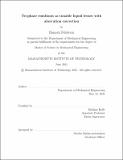Tri-phase emulsions as tunable liquid lenses with aberration correction
Author(s)
Feldstein, Hannah
DownloadThesis PDF (3.392Mb)
Advisor
Kolle, Mathias
Terms of use
Metadata
Show full item recordAbstract
Multi-phase emulsions represent a versatile material platform for the design of in-situ tunable lenses. One challenge in fluid lens design is the minimization of aberrations that are related to refraction of light at spherical interfaces. These aberrations can in principle be compensated by systematic arrangement of multiple spherical interfaces in succession within a compound lens. Adapting this approch to fluid optical elements, we assess the potential of tri-phase emulsions to correct primary aberrations. We combine optical modeling, fabrication and experimental characterization of tri-phase emulsions and compare their optical properties to bi-phase droplets. Ray-tracing, based on an experimentally realizable chemical composition of tri-phase emulsions, showed improvements in some, but not all of the monochromatic Seidel aberrations. However, in the case of minimizing multiple Seidel aberrations, the triphase emulsions significantly outperformed the bi-phase emulsions, as the tri-phase system contains more degrees of freedom than the bi-phase system does. Initial experimental validations of the optical properties of tri-phase emulsions with not fully optimized morphologies, which are comparable in their performance to more easily fabricated bi-phase emulsions, confirm the potential of tri-phase emulsions to correct aberrations, addressing a significant challenge in liquid micro-lens design.
Date issued
2021-06Department
Massachusetts Institute of Technology. Department of Mechanical EngineeringPublisher
Massachusetts Institute of Technology